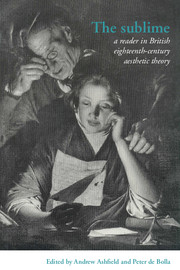Book contents
- Frontmatter
- Contents
- List of Abbreviations
- Introduction
- Part I The Longinian tradition
- Part II Rhapsody to rhetoric
- Part III Irish Perspectives
- Part IV The Aberdonian Enlightenment
- Part V Edinburgh and Glasgow
- Part VI From the Picturesque to the Political
- 41 A dissertation on oriental gardening (1772)
- 42 An essay on the picturesque (1794)
- 43 A review of The landscape (1795)
- 44 The history of the life of William Pitt, Earl of Chatham (1783)
- 45 Enquiry concerning political justice (1798)
- 46 Reflections on the revolution in France (1790)
- 47 A letter from the right honourable Edmund Burke to a noble lord (1796)
- 48 A vindication of the rights of man (1790)
- 49 Letters written in France (1790)
- 50 A tour in Switzerland (1798)
- Sources and further reading
44 - The history of the life of William Pitt, Earl of Chatham (1783)
Published online by Cambridge University Press: 05 June 2012
- Frontmatter
- Contents
- List of Abbreviations
- Introduction
- Part I The Longinian tradition
- Part II Rhapsody to rhetoric
- Part III Irish Perspectives
- Part IV The Aberdonian Enlightenment
- Part V Edinburgh and Glasgow
- Part VI From the Picturesque to the Political
- 41 A dissertation on oriental gardening (1772)
- 42 An essay on the picturesque (1794)
- 43 A review of The landscape (1795)
- 44 The history of the life of William Pitt, Earl of Chatham (1783)
- 45 Enquiry concerning political justice (1798)
- 46 Reflections on the revolution in France (1790)
- 47 A letter from the right honourable Edmund Burke to a noble lord (1796)
- 48 A vindication of the rights of man (1790)
- 49 Letters written in France (1790)
- 50 A tour in Switzerland (1798)
- Sources and further reading
Summary
But the eloquence of Lord Chatham was one of his most striking characteristics. He far outstripped his competitors, and stood alone, the rival of antiquity. When he took his place in parliament, it has been observed, by a celebrated writer, that there were half a dozen speakers, in both houses, who, in the judgment of the public, had reached nearly the same pitch of eloquence. Voltaire represents them, as rivalling, or surpassing the greatest orators of Greece and Rome. But the equality of their fame has justly been considered, as an unanswerable argument, against this supposition. In an art, which is either necessarily, or casually, in a state of mediocrity, twenty workmen will perform equally well; but, where true eminence has been reached, the comparative merit of the artists will be no longer doubtful. And indeed, how cold and jejune, in a poetical view, do the harangues of a Wyndham, or a Pulteney appear? But neither of these objections can be urged against Lord Chatham. He has tropes and sallies, that may justly vie, with the noblest flights of antiquity. And he certainly leaves his coadjutors, as far behind him, as ever did a Cicero, or a Demosthenes.
His eloquence was of every kind. No man excelled him, in close argument, and methodical deduction. But this was not the style, into which he naturally fell. His oratory was unlaboured and spontaneous.
- Type
- Chapter
- Information
- The SublimeA Reader in British Eighteenth-Century Aesthetic Theory, pp. 278 - 279Publisher: Cambridge University PressPrint publication year: 1996



